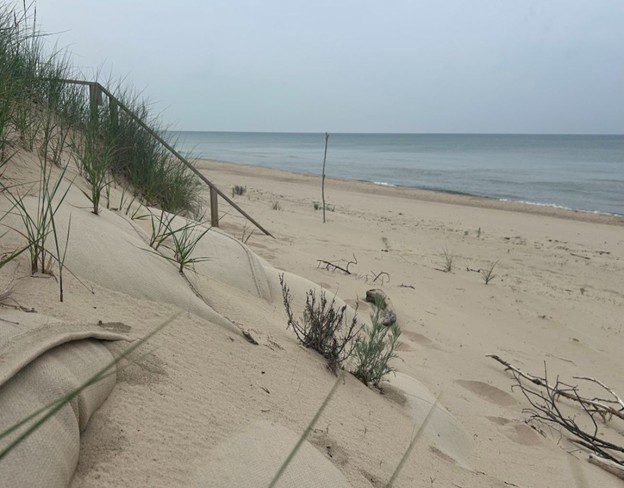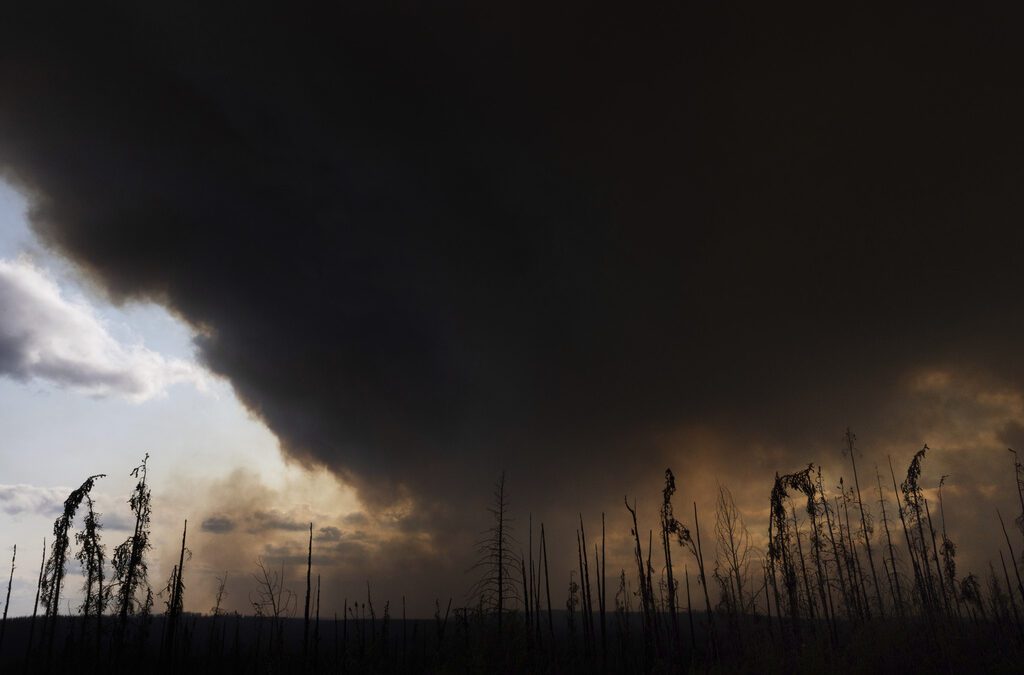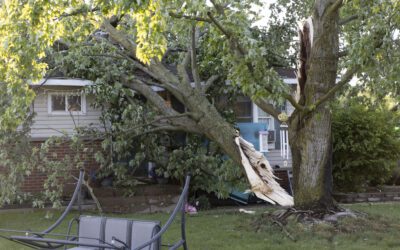
Clean energy standards signed into law this week are poised to accelerate Michigan’s transition to cleaner—and much more affordable—energy for all Michigan families.
MICHIGAN—Long-awaited legislation signed into law by Gov. Gretchen Whitmer this week will create new clean energy standards for the state’s electricity providers, requiring them to source most—and eventually all—of their energy through renewable sources over the next 17 years.
And beyond helping tackle the climate change crisis and protect the environment, the new laws are set to lower household utility costs by an average of $145 annually, create 160,000 new jobs, and lure nearly $8 billion in federal tax dollars to Michigan for clean energy projects.
“Michigan’s clean energy future is bright,” Whitmer said in a statement on Tuesday. “I am proud that these bills make Michigan the best state in the Midwest for climate action and the strongest state in the nation when it comes to labor standards for clean energy production. Together, we are fighting for our air, land, and water, improving public health and protecting our precious natural resources for future generations. We are building the future in Michigan.”
Whitmer first called for the passage of the legislation during a speech in late August, and Democratic lawmakers made quick work of the bills this month before adjourning for the year.
The new laws will mandate that Michigan must produce all of its energy from clean sources by 2040, as well as create new energy efficiency programs that state officials expect will translate to savings for Michiganders who are frustrated with the ever-rising cost of their energy bills.
“Every Michigander should be proud of this monumental step forward that emphasizes our commitment to saving families money, protecting Michigan’s resources, and ensuring a cleaner tomorrow,” Lt. Gov. Garlin Gilchrist said in a statement. “These bills will accelerate our state’s leadership on clean energy, unleash Michigan innovators’ competitive spirit, grow our economy, lower costs, cut carbon emissions, and make a difference for communities and workers.”
Here’s a quick overview of the legislation:
The five bills that comprise the “Clean Energy Future” plan—Senate Bills 271, 273, 277, 502, and 519—were signed into law on Tuesday, and will take effect beginning in February 2024.
Clean Energy Standards
Senate Bill 271 will require electric providers that are regulated by the Michigan Public Service Commission—like Consumers Energy and DTE—to source at least 50% of their energy from renewable sources by 2030, and then mandate 100% renewable energy by 2040.
Allowable renewable energy sources considered under the bill reportedly include wind, solar, nuclear, and natural gas that uses 90% effective carbon capture technology, biomass, landfill gas made from solid waste, gas from methane digesters using municipal sewage waste, food waste and animal manure, and energy-generating incinerators in operation before Jan. 1, 2023.
Sponsoring state Sen. Erika Geiss (D-Taylor) called the new law a “monumental step” toward creating healthier communities in Michigan and a more sustainable future for the planet.
“By transitioning to clean energy, we can decrease our dependence on fossil fuels and mitigate the harmful effects of our climate crisis,” Geiss said in a statement this week. “There is no Planet B, and it is incumbent upon us to secure a clean energy future that ensures marginalized communities are not continually, disproportionately affected by environmental hazards.”
Senate Bill 277 will protect farmers’ rights to to rent out their land for solar operations while still participating in the state’s farmland and open space preservation program. Lawmakers said the law will give farmers the freedom to use their land how they see fit—including by leasing part of their property to a developer, so they can earn some extra rental income on the side.
“When a heritage farmland owner has an environmentally friendly revenue option like solar to keep their land viable and in their families, the government should not be getting in the way,” sponsoring state Sen. Kristen McDonald Rivet (D-Bay City) said in a statement this week.
Support for Workers
Lawmakers said the transition away from energy like coal will create an education and skills gap for workers in the energy industry—but the package signed into law this week is set to help.
Senate Bill 519 calls for the creation of a new Community and Worker Economic Transition Office within the state Department of Labor and Economic Opportunities. It will be specifically designed to help workers and communities during the transition to more renewable energy.
“Michigan’s clean energy future will be built by hardworking union men and women,” Mike Barnwell, president of the Michigan Regional Council of Carpenters and Millwrights, said in a statement this week. “Gov. Whitmer and leaders in the Michigan legislature are setting an example for the rest of the country on how to face climate change head on while creating tens of thousands of good-paying clean energy jobs that pay fair wages and offer great benefits.”
A recent report from 5 Lakes Energy found that policies included in the newly signed laws would also help the state secure $7.8 billion more in federal investment from President Joe Biden’s Inflation Reduction Act, as well as create nearly 160,000 new jobs across the state.
Savings by Efficiency
State officials said the cheapest energy is energy that isn’t used, with every dollar spent on energy efficiency programs translating to about $4 in avoided energy costs for Michiganders.
Senate Bill 273 focuses largely on improving the state’s energy waste reduction efforts by requiring electric companies to find new ways to become more efficient with their energy—and that’s where the potential for more affordable electricity comes into play, lawmakers said.
Specifically, the new laws will increase the state’s energy waste reduction standard for electrical sources from 1% to 1.5% with a goal of 2%. The legislation will also slightly increase the standard for natural gas from 0.75% to 0.875% beginning in 2026, reports Michigan Advance.
The law also requires energy providers to create a low-income energy waste reduction program, and then direct 25% of their energy waste reduction spending to help support the new program.
Lawmakers said the idea is to help ensure energy improvements benefit residents with the greatest need—specifically Michiganders with low incomes or those living in multi-family homes.
“The bills signed by the governor set robust clean energy standards, and position Michigan to become a leader in responsibly fostering the critical shift away from fossil fuels, to a sustainable, clean energy future,” state Sen. Sam Singh (D-East Lansing) said in a statement this week. “We are demonstrating through bold action our commitment to creating a sustainable future.”
Since the Clean and Renewable Energy and Energy Waste Reduction Act was passed into law in 2009, Michiganders have saved almost $6 billion in electric costs and $2 billion in natural gas costs. The stiffer standards are expected to lead to additional savings for Michigan families.
“Michigan is now at the center of the nation’s transition to clean energy that will lower energy costs for families and small businesses, create good-paying, union jobs and tackle the climate crisis,” said Lisa Wozniak, executive director of the Michigan League of Conservation Voters.
Accountability
Senate Bill 502 will expand the role of the Michigan Public Service Commission (MPSC) with the goal of prioritizing reliability, affordability, and equity to programs. Senate Bill 271 will also empower the Attorney General or any customer to sue utilities that fail to meet the new standards, and create new reporting requirements to ensure that progress is being made.
“By integrating equity into the regulatory process, we will enable the MPSC to evaluate the effects of power generation in communities impacted by environmental injustice,” said state Sen. Sue Shink (D-Northfield Twp.). “These communities often consist of a higher proportion of people facing economic struggles and people of color, bear a disproportionate burden of pollution from power generation, and are more susceptible to the effects of climate change.”
Two other House bills signed into law this week—HB 5120 and HB 5121—will also authorize the MPSC to streamline the permitting of clean energy projects in the same way they do for other sources of energy. Lawmakers said the speedier permitting will help drive “billions of dollars” in federal and private investment in Michigan, while simultaneously creating new jobs statewide.
“We’re seizing the moment to make Michigan a national leader in clean energy production while creating jobs and lowering costs,” state Rep. Ranjeev Puri (D-Canton) said in a statement.
A coalition of environmental groups—including the Michigan Environmental Council and the Michigan League of Conservation Voters—signed a statement in support of the bills this month.
“These bills provide the Michigan Public Service Commission more tools to regulate big utilities and ensure more residents are able to participate in that oversight,” it reads. “Without these bills, Michiganders would continue to pay the highest rates for the worst service in the Midwest.”
Statewide polling released in April from Data for Progress shows that the legislation signed into law this week is extraordinarily popular among most Michiganders, with 65% of voters reporting that they support legislation to transition the state’s energy grid to 100% clean energy, and 73% noting that they want state lawmakers to do more to keep energy bills affordable.
Still, nearly every Republican lawmaker in the state House of Representatives voted against the legislation when it came up for a vote this month, including House Minority Leader Matt Hall.
READ MORE: New ‘Power for All’ bills to help Michiganders harness more solar energy
For the latest Michigan news, follow The ‘Gander on Twitter.
Follow Political Correspondent Kyle Kaminski here.
Support Our Cause
Thank you for taking the time to read our work. Before you go, we hope you'll consider supporting our values-driven journalism, which has always strived to make clear what's really at stake for Michiganders and our future.
Since day one, our goal here at The 'Gander has always been to empower people across the state with fact-based news and information. We believe that when people are armed with knowledge about what's happening in their local, state, and federal governments—including who is working on their behalf and who is actively trying to block efforts aimed at improving the daily lives of Michigan families—they will be inspired to become civically engaged.


Empowering environmental stewardship: barn sanctuary champions compassion and conservation
By Donté Smith, Capital News Service LANSING — The Great Lakes, a vital freshwater expanse for millions, face an ongoing environmental crisis....

Can Michigan’s forests survive climate change? One researcher is finding out
By Emilio Perez Ibarguen, Capital News Service LANSING – As Michigan’s climate warms, tree species like red pine and eastern white pine may no...

Years after high water crisis, lax policies leave Michigan coast vulnerable
By Emilio Perez Ibarguen, Capital News Service LANSING – Kathy and Tom Brickley knew erosion would be an immutable part of owning a property on Lake...

Air quality worsens in eastern US as Canadian wildfire smoke hangs over Midwest
PORTLAND, Maine (AP)—Smoke from Canadian wildfires worsened air quality in the eastern U.S. on Wednesday as several Midwestern states battled...

Landmark study finds Great Lakes have entered a new era with climate change, extreme events
The Great Lakes has officially entered a new climate era, and the past is no longer a reliable guide for the future. That's the landmark finding in...





